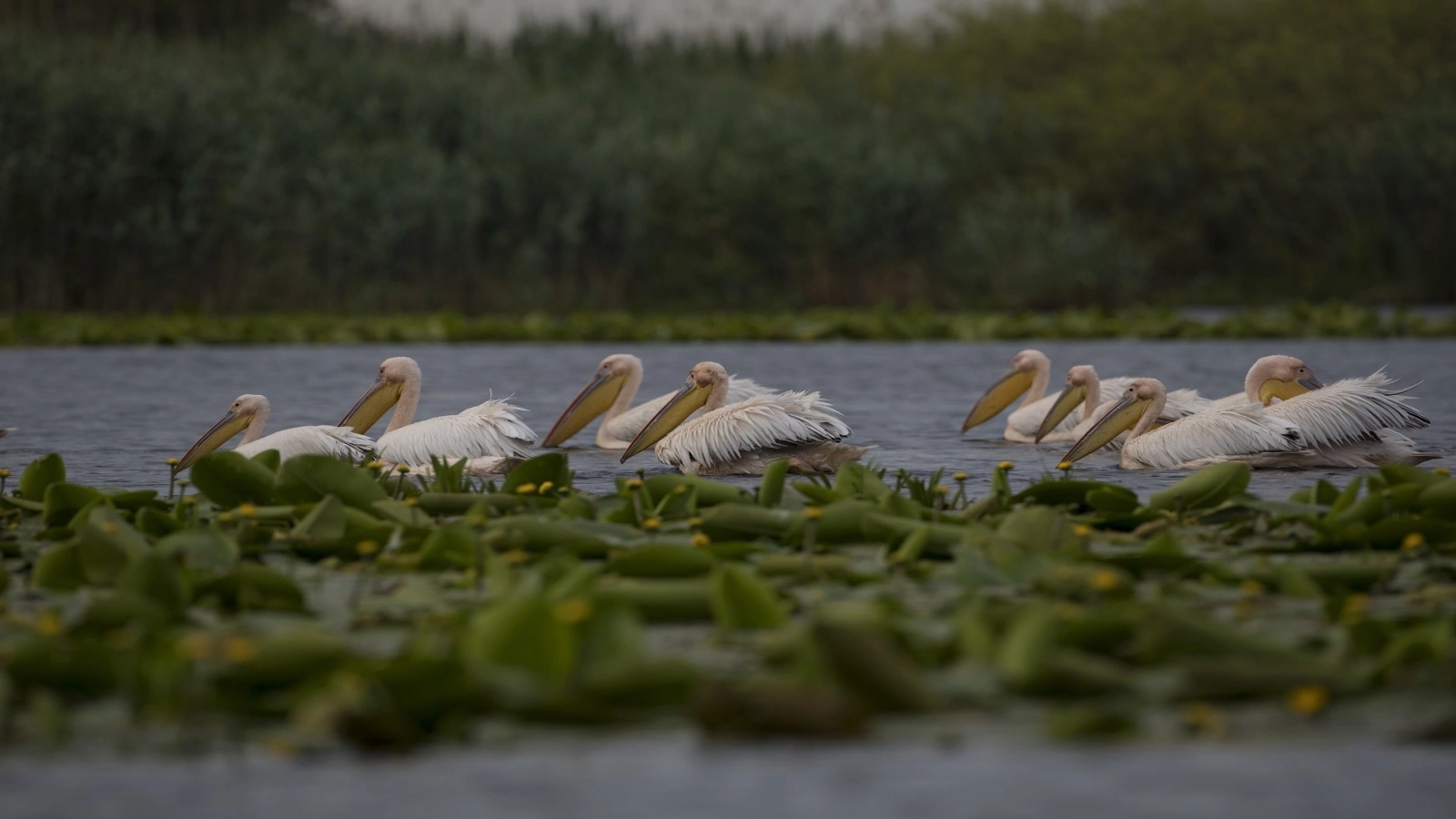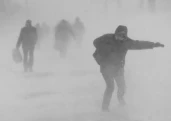The only pelicans colony in Romania settles near Navodari, outside the Danube Delta.
The only colony of Dalmatian pelicans that can be seen on Romanian territory settled outside the Danube Delta Biosphere Reserve, near the town of Navodari, told Agerpres.
The curly-headed pelican is a strictly protected species, being at the same time a symbolic species for the Danube Delta. Unlike the common pelican, The Dalmatian is not a long-distance migrant. Also, the species is much less numerous in Romania and nests in a few places, in very small colonies of a few dozen pairs. The birds have a grayish white plumage. When they have their nuptial plumage, a tuft of curly and soft feathers appears on the head, which in very old birds reaches a length of 14-16 cm, while the throat is coloured intensely in coral red.
The colony near Navodari began to form ten years ago, and currently numbers 50-60 pairs. Sebastian Bugariu, biologist within the Romanian Ornithological Society (SOR) and coordinator for Romania of the "Pelican Way of LIFE" project, says that pelicans can be tracked with optical instruments, but access to their proximity is prohibited. "The colony must not be disturbed no matter what," Bugariu emphasized.
"It is very important to specify that, approximately ten years ago, a new colony came and settled here, outside the Danube Delta, which means that there has been a population recovery in recent decades, and that the species is beginning to reoccupy different areas from the old nesting area and form new colonies (...) About ten years ago, four or five pairs appeared and, progressively, the number increased from one year to the next, as a result of the fact that they encountered very good conditions in the area. At the present time, the flock is somewhere between 50-60 pairs, which for a colony of pelicans - it must be said that they nest in much smaller flocks, in more dispersed colonies - is a very good number," added the biologist.
Sebastian Bugariu supports the establishment of an information centre in the area, the programme of which should include educational activities. This could be done in partnership with the National Agency for Protected Areas or with the local authority.
"It is an area that is still very well preserved from a natural point of view. It is an area that hosts many species of birds in migration and during the nesting period. At the same time, it is a Natura 2000 site, so it has the status of a protected natural area, with a management plan, and this thing is probably very little known to the general public. We are trying to bring into the plan the fact that, especially in the area of Dobrogea, there are still many protected natural areas that host many natural values," he stated.
The curly-headed pelican can be seen in the colony near Navodari during the nesting period. In the winter months, they congregate in large numbers in areas of the Danube Delta or in Bulgaria. In recent decades, because the climate has softened, nesting has started to take place earlier and earlier.
"In the countries of South-Eastern Europe, such as Greece or Bulgaria, they start nesting right in January. In Romania, at the end of January they are in the nesting areas and in February they are already on the nests. Now the chicks are already big. (.. .) A few decades ago, the egg-laying period was rather in March, now it can happen in February," Bugariu pointed out.
According to him, the pelican is a colonial and gregarious species, with a high degree of social interaction between individuals in the colony. There is apparently also a loyalty to the nesting places, so that, many times, the individuals coming from a certain colony return there.
"They travel very large distances in relatively short periods of time. This species nests in Eastern Europe. Certain individuals were tracked by satellite and it turned out that they visit different countries, different nesting colonies, different areas where this species creates big crowds outside the nesting period. They often travel hundreds of kilometres in a single day or in a few hours. So they move from the crowded areas in central Bulgaria to here or from here to the Danube Delta, back to the Danube," stated Sebastian Bugariu.
He emphasized the importance of quality, sustainable tourism, where people observe the birds without disturbing them. In this sense, he drew attention to the danger represented by the type of short trips organized in the Danube Delta, with boats with powerful engines.
"In the Danube Delta, during the summer, obviously, everyone wants to see pelicans. It's an emblematic species and everyone wants to see them. There have been organized trips to the Danube Delta - often very short trips of a day or a few hours - on large-capacity boats with large engines. Basically, tourists are carried at high speed through the Delta. They don't get to see much. If there is anywhere spotted a flock of pelicans feeding, the boats speed in for the pelicans to stand up and put on a show. This is the kind of tourism we are trying to combat. Nature lovers know that this is not how quality tourism is done and sustainable. Because sustainable means not disturbing the birds in their environment," the biologist explained.
The Romanian Ornithological Society has been working for over 20 years and is developing conservation programmes aimed at protecting the population of Dalmatian pelicans in Romania. Currently, SOR is involved in the third project of this type, "Pelican Way of LIFE," which includes activities aimed at reducing threats to captive pelicans and improving their habitat in 27 sites in Romania, Bulgaria, Greece and Ukraine.
































Comentează